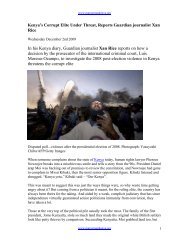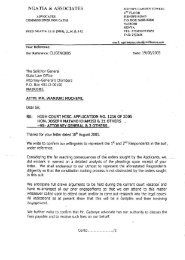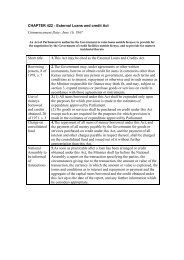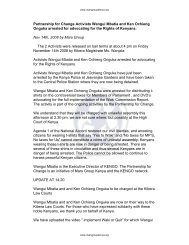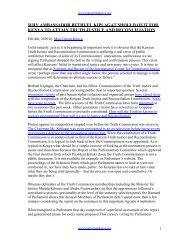Navy story.indd - Mars Group Kenya Publications
Navy story.indd - Mars Group Kenya Publications
Navy story.indd - Mars Group Kenya Publications
Create successful ePaper yourself
Turn your PDF publications into a flip-book with our unique Google optimized e-Paper software.
south africa The ANC’s toughest<br />
election ever – in December 2007<br />
It will be the fiercest-fought election the African<br />
National Congress has faced since coming<br />
to power in 2004: it is the ANC’s National<br />
Conference in December 2007 that will elect the<br />
party president and the party’s Presidential flagbearer<br />
in the 2009 elections.<br />
schism in the party<br />
Even the most conservative African National Congress<br />
activists admit that a schism has developed in the<br />
party between supporters of President Thabo Mbeki and<br />
those of sacked Deputy President Jacob Zuma. Yet they<br />
cannot agree about why the schism has developed and<br />
whose fault it is. Zuma’s fans are the usual opponents<br />
of President Mbeki’s conventional economic policies: the<br />
Congress of South African Trade Unions (Cosatu) and the<br />
South African Communist Party (SACP). He also attracts<br />
support from the poor and working class, frustrated by the<br />
slow pace of service delivery, growing unemployment and<br />
rising crime.<br />
Most controversially there is the Zulu factor: Zuma, the<br />
cattle herder from Inkandla, is tremendously popular in<br />
his own kwaZulu/Natal (KZN) province. He addresses<br />
rallies and even courtrooms in isiZulu and enthusiastically<br />
attends provincial functions in traditional garb. Zulus<br />
make up some 24 per cent of South Africa’s population.<br />
Yet Zuma cannot play the Zulu card too strongly for fear<br />
of alienating his support among the Xhosa (18 per cent),<br />
Sesotho (7.9), Sepedi (9.4), Setswana (8.2) and other<br />
groups such as whites (9.6), coloured (8.9) and Indians<br />
(2.5). He would never be forgiven for dividing the ANC<br />
on ethnic lines, a core strategy of the old National Party<br />
regime; and arithmetically it would make no sense.<br />
Zuma’s best chance is to hold a broad pro-poor alliance –<br />
without alienating business. When asked by journalist RW<br />
Johnson for his own – as opposed to the ANC’s – political<br />
views, Zuma replied: ‘You could say I have a passion for the<br />
poor. I’m not happy that after more than 10 years in power<br />
that so many of our people are still living in shacks. And<br />
far more needs to be done to help poor rural people. The<br />
Bantustans were abolished but nothing has been done to<br />
replace the money they brought into the rural areas.’<br />
Those concerns resonate with South Africans. For many,<br />
Zuma symbolises the South African struggle: growing up<br />
in poverty without formal education, he learned English<br />
from his fellow prisoners on Robben Island. He then<br />
rose to head ANC intelligence and, after 1994, took the<br />
lead in negotiating a truce between the ANC and Chief<br />
Mangosuthu Buthelezi’s Inkatha Freedom Party.<br />
Opposing the Zuma camp are Mbeki’s core supporters in<br />
the cabinet, the 60-strong National Executive Committee,<br />
the 25-strong National Working Committee and groups<br />
throughout the ANC’s 365 branches. Mbeki is preferred by<br />
the prosperous and those who run businesses, people who<br />
mostly view a Zuma presidency with undisguised horror.<br />
Yet Zuma seems to be winning the propaganda battle<br />
in the private media, which carried a tide of anti-Mbeki<br />
stories, fuelled by public rows between the factions. Last<br />
month, former Premier of Limpopo province Ngoako<br />
Ramatlhodi turned up at the Free State Provincial<br />
General Council and accused Mbeki of crippling the ANC.<br />
A few weeks later, Billy Masetlha, the sacked Director of<br />
the National Intelligence Agency, told ANC Youth League<br />
members that the ANC was in the wrong hands and was<br />
dominated by a narrow group of ‘ten people’. There are<br />
many other politicians who would relish a chance to settle<br />
scores with Mbeki.<br />
Hearts, minds and votes<br />
There are two levels to the battle: the tactical one of<br />
influencing the hearts and minds of media, unions<br />
and political rallies; and the strategic one of winning the<br />
vote at the ANC’s National Conference in December 2007.<br />
It is the ANC’s National Deployment Committee (NDC),<br />
currently weighted in favour of Mbeki, which decides the<br />
candidates nominated at the conference. In theory the<br />
NDC could keep Zuma off the ballot, but it will be the<br />
delegates from the ANC’s 365 branches across South Africa<br />
who cast the votes to elect the party’s next President.<br />
Those delegates will represent the ANC’s 150,000-200,000<br />
paid-up members, but there will be much surveillance if<br />
not outright intervention from the centre as to how the<br />
branches choose delegates.<br />
Zuma’s advantage is that for the present his is the only<br />
hat in the ring. Other candidates for the ANC’s presidential<br />
nomination – such as former ANC Secretary General Cyril<br />
Ramaphosa, Defence Minister Mosiuoa Lekota and<br />
Reserve Bank Governor Tito Mboweni – will only emerge<br />
in the coming months.<br />
For now, Zuma is way ahead in the public recognition.<br />
As soon as Justice Herbert Msimang threw out the state’s<br />
corruption case against him on 20 September, mass<br />
demonstrations of support broke out. Hours later, Zuma<br />
was hoisted onto the stage at Cosatu’s national conference<br />
and presented by union leaders as the country’s next<br />
president. Yet the National Prosecuting Authority (NPA) is<br />
still investigating Zuma’s affairs and will almost certainly<br />
bring new corruption charges against him. Any failure to<br />
do so will be seen as accepting Zuma’s argument that there<br />
was a political conspiracy against him orchestrated by NPA<br />
Director Bulelani Ngcuka.<br />
Well-orchestrated pro-Zuma conference speeches and<br />
demonstrations accompanied two successive attempts to<br />
<br />
2 0 O c t o b e r 2 0 0 6 - V o l 4 7 - N ° 2 1 - A f r i c a C o n f i d e n t i a l



